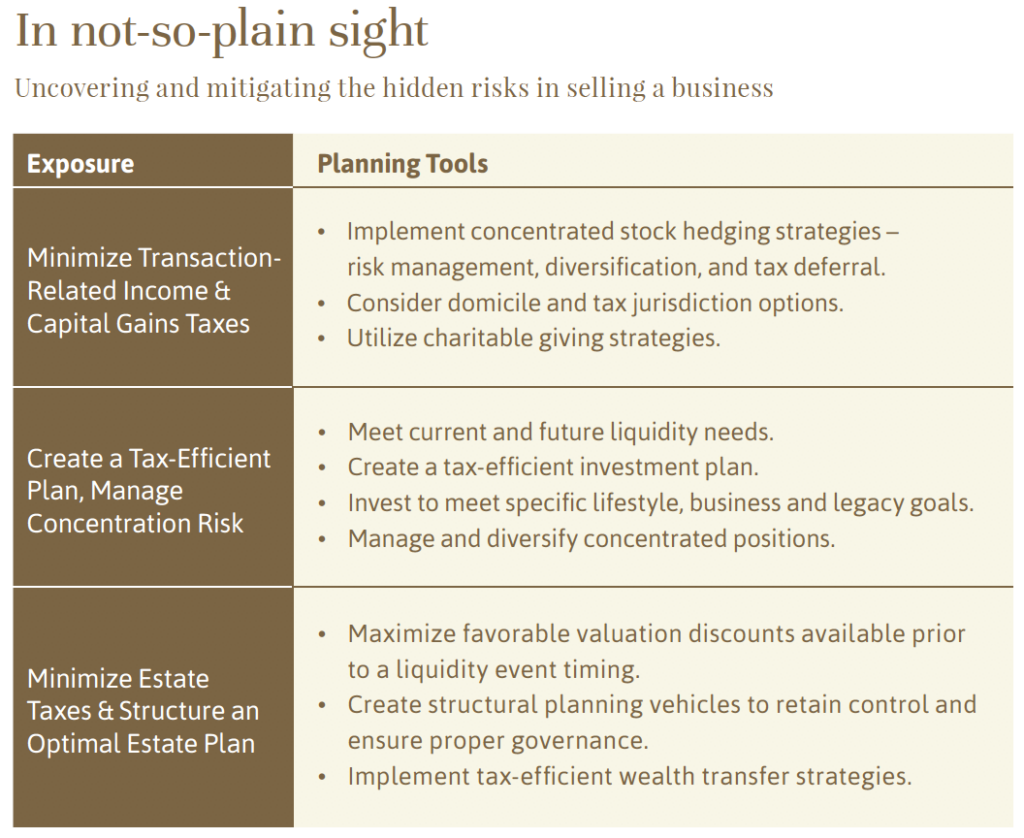
Independent Thinking®
Hidden Risks in Selling a Business
December 11, 2019

Hidden risks can imperil the successful sale of a business, with lasting repercussions for the owner and his or her family, unless some hard questions are addressed well ahead of the transaction.
Is the price right? What form should the proceeds take? What are the pre-transaction planning opportunities for the efficient transfer of wealth?
No one wants to sell at a low price, of course, and buyers will certainly have their own view on the value of the company. But even impressive-looking deal numbers can be worth less than they seem, after tax and transaction costs, and owners will want to consider the appeal of all offers in that context. The biggest risk in selling a business is that the real proceeds will not allow the seller to secure personal financial goals.
Once the value is broadly agreed, what form will the sale proceeds take? Retaining too much equity in the business – a real temptation for those who aren’t ready for retirement – can mean an unacceptable lack of liquidity and diversification. Retaining too little equity risks forfeiting future growth.
These exposures – and the related tax consequences – can be minimized though advance planning, as illustrated in the chart below. For example, an installment sale – as opposed to an outright sale – can enable a business owner to realize gains over time, rather than incurring capital gains tax on the entire transaction at once. (Also, the buyer may be willing to pay a premium for the additional payment time.) Receiving stock as part of the sale proceeds also allows for a well-timed diversification and hedging plan, not only to defer capital gains but to minimize risk. However, the seller will be hostage to the fortunes of a business that he or she no longer controls.

It’s important to note that exchanging equity in a private company for shares in a public acquiring company doesn’t necessarily enhance diversification or liquidity. Indeed, it may limit liquidity if the new holding is subject to restrictive securities laws, a factor that should be thoroughly examined in pre-transaction planning.
Securing lifestyle and retirement goals and maximizing gift tax exemptions, both before and after the sale, need not be mutually exclusive, as long as planning starts well in advance. It is entirely possible to efficiently transfer assets while retaining some level of control and security. A charitable remainder trust can allow a philanthropically-minded seller to reduce a taxable gain and supplement his or her own income for life through the conversion of sale proceeds, whether cash, highly appreciated public shares or a blend of the two, into a diversified income stream.
Trusts can also protect future growth. If the company is likely to continue growing, this may be the time to plan gifts to family that can leverage the relatively low value and allow for future growth to the next generation. There may also be ways to take advantage of allowable discounts for lack of marketability and lack of control. A well-thought-out plan can result in options for giving away only the appreciation of the asset to family and retaining either an income stream or the base capital.
Each of these options raises big questions for prospective sellers and their families, which will be addressed further in future issues of Independent Thinking. They are certainly deserving of thoughtful, personal discussions with advisors in the context of individual and family circumstances and goals. With the right planning and support, selling a business can be an exciting and rewarding transition to the next stage of life.
Stacie Price is a Partner and Wealth & Fiduciary Advisor at Evercore Wealth Management and Evercore Trust Company. She can be contacted at [email protected].
